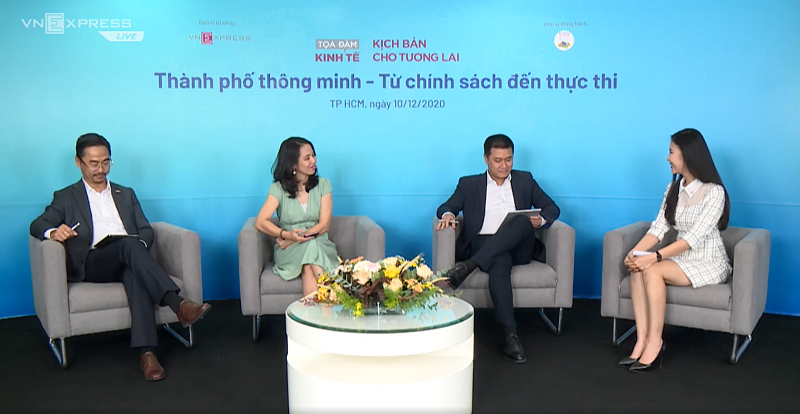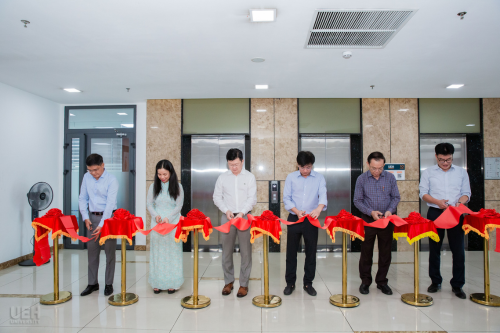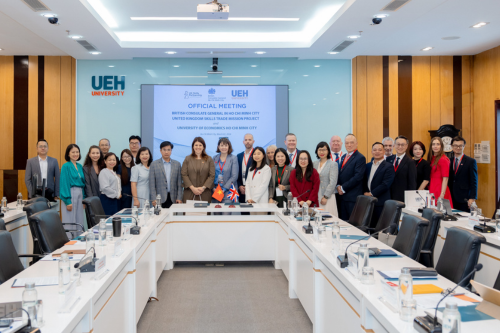"The important role of universities and research institutes in Smart City development"
21 Dec, 2020
Smart city is an urban model that applies information technology and artificial intelligence to manage and improve living standards, improve service quality of the city government and use energy resources and natural resources efficiently. Smart city is one of the major topics of the world, set out to answer the question: What will the future of billions of people living in cities be with deep participation of technology?
According to the smart city development project, by 2025, Vietnam has at least three smart cities in three key economic regions in the North, the Central and the South and more than 40 cities that are oriented towards smart city development. By 2030, Vietnam will have formed a chain of smart cities in key economic regions, step by step connecting with smart cities in the region and in the world. How do people and businesses benefit from this model? What are the conditions needed to build an efficient smart city? How are the roles of the three "houses": the state, the university and the entrepreneur?
On the morning of October 12, 2020, representatives of University of Economics Ho Chi Minh City (UEH) - Dr. Trinh Tu Anh: Director of the Institute of Smart City and Management (UEH) participated in the Online Economic Seminar: Scenarios for the future of Smart City - From policy to implementation. The seminar was also attended by Mr. Nguyen Viet Long - Deputy Director of Binh Duong Department of Technology, Director of Binh Duong Smart City Office, Mr. Phan Thanh Son - Director of Strategic Sales Department, FPT Corporation.

Dr. Trinh Tu Anh - Director of the Institute of Smart City and Management (UEH) participated in the Economic Seminar: Scenarios for the future of Smart City - From policy to implementation
At the seminar, the guests discussed in depth the fundamental elements of the smart city model, opportunities and challenges of cities in Vietnam in implementing this project, as well as key recommendations. This model works in a leading regional economy. Experts say that it takes coordination from both the state, universities and entrepreneurs to build effective smart cities.
From the university's perspective, Dr. Trinh Tu Anh has many interesting things to share about smart city:
When it comes to smart cities, what are the first 5 keywords that you come up with?
Standing on the aspect of university/research institute and having researched for quite a period of time in this field, the 5 keywords that I find very essential for the current story of metropolis/city development are "integration", "consistency", "urban problem solving", "using resources efficiently", "smart technology".
From the university's perspective, how do you define a smart city?
There are many definitions of cities or smart cities, each country will choose a definition suitable for its context to develop. From the point of view of the Institute of Smart City and Management and its collaborators, we can see the city as a living body of a human being, the more active the metropolis/city is, the more active it is. spawned many different problems. So a smart metropolis/city is a place where you can solve urban problems through the application of technology with the resources you have effectively, towards sustainable development. Smart metropolises/cities are a growing trend all over the world, proving to have solved many urban problems. However, in the next 5 or 10 years, another more effective metropolis/city model in sustainable development may come into being. No matter which metropolis/city model is developed, the ultimate goal is sustainable development and enhancement of the quality of human life.
From the university's perspective, what are the criteria to consider a smart city?
From the point of view of the Institute of Smart Cities and Management, smart city is a place where people truly feel happy, where they are able to use tools according to their needs and efficiency.
In Vietnam, what are the challenges of the smart city model now?
In my opinion, the biggest challenge of the current smart metropolis/city model is how cities/localities must choose their own identity or issues that need to be prioritized to be thoroughly solved within a certain period of time and calling on everyone from all fields, departments... to join together to implement that goal.
What lessons can Vietnam learn from, or should avoid, from smart cities around the world?
After a long time studying smart cities, visiting many smart cities to learn, professors and experts in the world also shared that there is really no final destination of a smart city. The smart city is the path to the end, not the final destination. Therefore, each locality needs to determine what they need to do in the next 10-20 years, locate their locality on the map of the city's sustainable development. In addition, a very important issue is the open mindset, the willingness to share information and work together to solve any problems in the city. University of Economics Ho Chi Minh City established the Institute of Smart City and Management to create an integrated platform - Where the "progressive" from the government, the locality, the stakeholder, the local population domestic and international... are ready to share information openly for the common goal of the community.
What is the role of the university in smart city development?
In addition to training human resources that are high in quality and meet the needs of businesses and society, the University/Research Institute is also an integrated platform - where all fields, units, sectors inside and outside can share - education - research - consultation - decision support - evaluation - control strategies, projects, projects, schemes to solve solve problems in society. It also helps motivated experts and scientists from universities and research institutes to do what they want and share information for the common goal of the community.
What does the university want to participate in the smart city development policy?
Currently, each of our subjects is aimed at solving a certain problem of the city, of life, so we expect universities to be more involved in strategies, projects, researches to develop smart cities from the beginning with the role of consulting and decision-making. With the investment and development of smart urban studios, urban simulation (at the Institute of Smart Cities and Management of the University of Economics Ho Chi Minh City) as well as other laboratories of many universities In other learning, we aim to become R&D centers and together with enterprises and the state to build living labs to solve the problems that smart cities address in each locality, each unit according to specific requirements.
News, photos: Marketing - Communication, Institute of Smart Cities and Management.





![[Research Contribution] Modernizing and Elevating Vietnamese Higher Education: Creating Breakthroughs in High-Caliber Human Resource Development and Talent Cultivation, Leading Research and Innovation](/images/upload/thumbnail/ueh-thumbnail-639083193174001549.png)

![[Research Contribution] Sustainable Manufacturing: A Driving Force for the Green Economy and the Challenges Ahead](/images/upload/thumbnail/ueh-thumbnail-639082294182922007.png)





